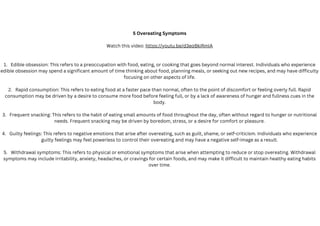5 Overeating Symptoms
•
0 likes•7 views
Learn the best strategies for weight loss in 2023.
Report
Share
Report
Share
Download to read offline

Recommended
Recommended
More Related Content
Similar to 5 Overeating Symptoms
Similar to 5 Overeating Symptoms (20)
Eating Disorders: Symptoms, Causes, Diagnosis and Treatment

Eating Disorders: Symptoms, Causes, Diagnosis and Treatment
Bulimia nervosa ( Eating Disorders) Mental Health Nursing.

Bulimia nervosa ( Eating Disorders) Mental Health Nursing.
Eating Disorder A Threat To Life | Solh Wellness.pdf

Eating Disorder A Threat To Life | Solh Wellness.pdf
More from Astrology Realm
More from Astrology Realm (7)
Find Out Which Zodiac Sign is BEST for Dating a Gemini!

Find Out Which Zodiac Sign is BEST for Dating a Gemini!
The Surprising Answer to the Ideal Sign to Date a Pisces Woman!

The Surprising Answer to the Ideal Sign to Date a Pisces Woman!
Uncovering the Secrets to Leo Compatibility You'll Be Surprised! 

Uncovering the Secrets to Leo Compatibility You'll Be Surprised!
Recently uploaded
Private : +91 9999965857 Affairs: Paschim Vihar Call Girls {{ Monika}} Delh...

Private : +91 9999965857 Affairs: Paschim Vihar Call Girls {{ Monika}} Delh...Call Girls In Delhi Whatsup 9873940964 Enjoy Unlimited Pleasure
Recently uploaded (20)
7 Oldest Churches in America that will Rejuvenate your Soul.pdf

7 Oldest Churches in America that will Rejuvenate your Soul.pdf
Chandigarh Escorts Service 📞9915851334📞 Just📲 Call Rajveer Chandigarh Call Gi...

Chandigarh Escorts Service 📞9915851334📞 Just📲 Call Rajveer Chandigarh Call Gi...
Private : +91 9999965857 Affairs: Paschim Vihar Call Girls {{ Monika}} Delh...

Private : +91 9999965857 Affairs: Paschim Vihar Call Girls {{ Monika}} Delh...
Hi Profile Escorts In Udaipur 09602870969 Call Girls in Sobaghpura Bhopalpura

Hi Profile Escorts In Udaipur 09602870969 Call Girls in Sobaghpura Bhopalpura
Call Girls in Bangalore Lavya 💋9136956627 Bangalore Call Girls

Call Girls in Bangalore Lavya 💋9136956627 Bangalore Call Girls
Zirakpur Call Girls👧 Book Now📱8146719683 📞👉Mohali Call Girl Service No Advanc...

Zirakpur Call Girls👧 Book Now📱8146719683 📞👉Mohali Call Girl Service No Advanc...
Russian BINDASH Call Girls In Mahipalpur Delhi ☎️9711199012

Russian BINDASH Call Girls In Mahipalpur Delhi ☎️9711199012
💞5✨ Hotel Karnal Call Girls 08168329307 Noor Mahal Karnal Escort Service

💞5✨ Hotel Karnal Call Girls 08168329307 Noor Mahal Karnal Escort Service
💞Call Girls In Sonipat 08168329307 Sonipat Kundli GTK Bypass EsCoRt Service

💞Call Girls In Sonipat 08168329307 Sonipat Kundli GTK Bypass EsCoRt Service
VIP Model Call Girls Buldhana Call ON 8617697112 Starting From 5K to 25K High...

VIP Model Call Girls Buldhana Call ON 8617697112 Starting From 5K to 25K High...
Nahan call girls 📞 8617697112 At Low Cost Cash Payment Booking

Nahan call girls 📞 8617697112 At Low Cost Cash Payment Booking
Russian CalDeed Circle Call Girls Service ☎ ️93326-06886 ❤️🔥 Enjoy 24/7 Esco...

Russian CalDeed Circle Call Girls Service ☎ ️93326-06886 ❤️🔥 Enjoy 24/7 Esco...
UDAIPUR CALL GIRLS 96O287O969 CALL GIRL IN UDAIPUR ESCORT SERVICE

UDAIPUR CALL GIRLS 96O287O969 CALL GIRL IN UDAIPUR ESCORT SERVICE
VIP 💞🌷Call Girls In Karnal 08168329307 Escorts Service Nilokheri Call Girls

VIP 💞🌷Call Girls In Karnal 08168329307 Escorts Service Nilokheri Call Girls
"Maximizing your savings:The power of financial planning".pptx

"Maximizing your savings:The power of financial planning".pptx
Call Girls in Bangalore Prachi 💋9136956627 Bangalore Call Girls

Call Girls in Bangalore Prachi 💋9136956627 Bangalore Call Girls
Call girls in Vashi Services : 9167673311 Free Delivery 24x7 at Your Doorstep

Call girls in Vashi Services : 9167673311 Free Delivery 24x7 at Your Doorstep
Dubai Call Girls Phone O525547819 Take+ Call Girls Dubai=

Dubai Call Girls Phone O525547819 Take+ Call Girls Dubai=
Call Girls Udaipur Just Call 9602870969 Top Class Call Girl Service Available

Call Girls Udaipur Just Call 9602870969 Top Class Call Girl Service Available
WhatsApp 📞 8448380779 ✅Call Girls In Bhangel Sector 102 ( Noida)

WhatsApp 📞 8448380779 ✅Call Girls In Bhangel Sector 102 ( Noida)
5 Overeating Symptoms
- 1. 5 Overeating Symptoms Watch this video: https://youtu.be/d3eqBkiRmIA 1. Edible obsession: This refers to a preoccupation with food, eating, or cooking that goes beyond normal interest. Individuals who experience edible obsession may spend a significant amount of time thinking about food, planning meals, or seeking out new recipes, and may have difficulty focusing on other aspects of life. 2. Rapid consumption: This refers to eating food at a faster pace than normal, often to the point of discomfort or feeling overly full. Rapid consumption may be driven by a desire to consume more food before feeling full, or by a lack of awareness of hunger and fullness cues in the body. 3. Frequent snacking: This refers to the habit of eating small amounts of food throughout the day, often without regard to hunger or nutritional needs. Frequent snacking may be driven by boredom, stress, or a desire for comfort or pleasure. 4. Guilty feelings: This refers to negative emotions that arise after overeating, such as guilt, shame, or self-criticism. Individuals who experience guilty feelings may feel powerless to control their overeating and may have a negative self-image as a result. 5. Withdrawal symptoms: This refers to physical or emotional symptoms that arise when attempting to reduce or stop overeating. Withdrawal symptoms may include irritability, anxiety, headaches, or cravings for certain foods, and may make it difficult to maintain healthy eating habits over time.
